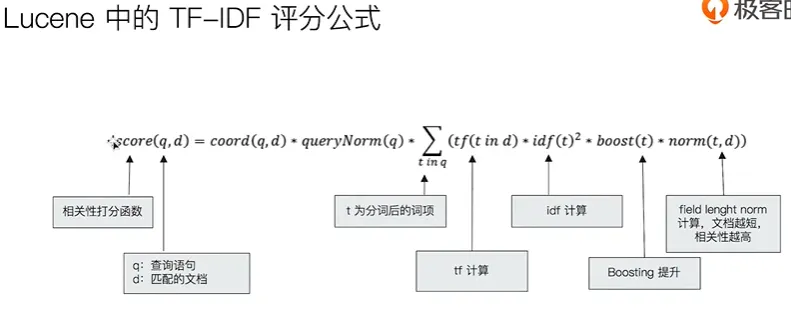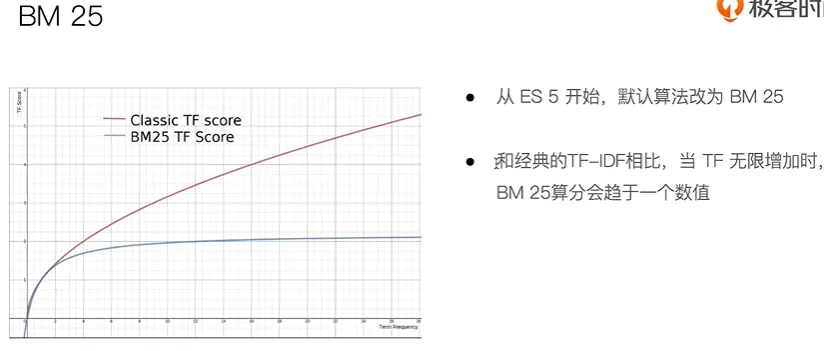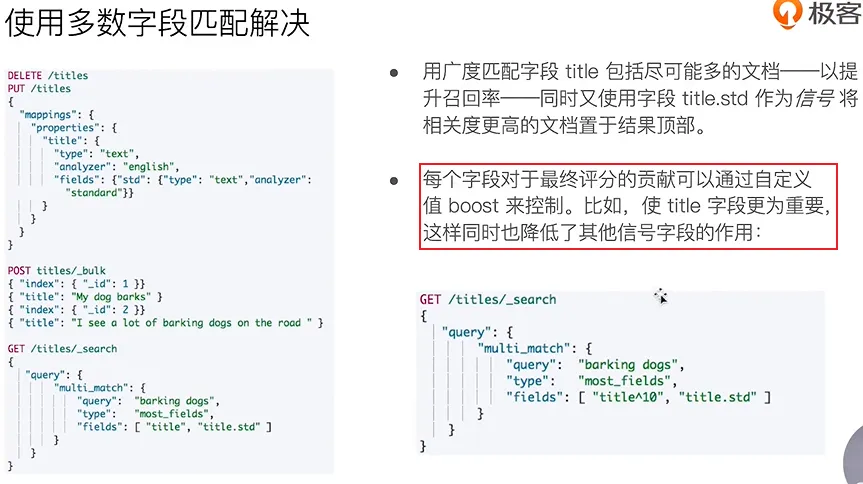Term查询
Term Query / Range Query / Exists Query / Prefix Query / Wildcard Query
特点:
- 对输入不做分词, 因此应检索keyword
- 会为每个包含该词项的文档进行相关度算分
- 可用constant score将查询转换成一个filtering, 避免算分, 并利用缓存, 提高性能
# term查询
GET movies/_search
{
"query": {
"term": {
"title.keyword": {
"value": "2012"
}
}
}
}
# 利用constant_score转为filter
GET movies/_search
{
"query": {
"constant_score": {
"filter": {
"term": {
"title.keyword": "2012"
}
}
}
}
}全文查询
Match Query / Match Phrase Query / Query String Query
特点:
- 索引和搜索时都会分词, 查询字符串会先分词生成一个共查询的词项列表
- 会算分
# 全文查询
POST movies/_search
{
"query": {
"match": {
"title": {
"query": "Matrix reloaded",
"operator": "and"
}
}
}
}
POST movies/_search
{
"query": {
"match": {
"title": {
"query": "Matrix reloaded",
"minimum_should_match": 2
}
}
}
}
POST movies/_search
{
"query": {
"match_phrase": {
"title": {
"query": "Matrix reloaded",
"slop": 1
}
}
}
}结构化搜索
结构化搜索是指对结构化数据的搜索, 其中日期, 布尔类型和数字都是结构化的, 文本也可以是结构化的.
# 对布尔类型, 数字类型直接term查询, 可以用constant_score转filter, 避免算分
# 当term查询的字段是数组类型时, 是包含关系, 而不是等值
# 如果要求等值, 则需在索引中加一个计数字段, 然后通过bool查询叠加条件实现
#数字类型 terms
POST products/_search
{
"query": {
"constant_score": {
"filter": {
"terms": {
"price": [
"20",
"30"
]
}
}
}
}
}
#字符类型 terms
POST products/_search
{
"query": {
"constant_score": {
"filter": {
"terms": {
"productID.keyword": [
"QQPX-R-3956-#aD8",
"JODL-X-1937-#pV7"
]
}
}
}
}
}
#数字 Range 查询
GET products/_search
{
"query" : {
"constant_score" : {
"filter" : {
"range" : {
"price" : {
"gte" : 20,
"lte" : 30
}
}
}
}
}
}
# 日期 range
POST products/_search
{
"query" : {
"constant_score" : {
"filter" : {
"range" : {
"date" : {
"gte" : "now-1y"
}
}
}
}
}
}
#exists查询
POST products/_search
{
"query": {
"constant_score": {
"filter": {
"exists": {
"field": "date"
}
}
}
}
}
# 查询不存在date字段的文档
POST products/_search
{
"query": {
"constant_score": {
"filter": {
"bool": {
"must_not": {
"exists": {
"field": "date"
}
}
}
}
}
}
}相关性算分
搜索的相关性算分, 描述了一个文档和查询语句匹配的程度. 打分的本质是排序, 需要把最符合用户需求的文档排在前面, es5后默认的相关性算分采用BM25.
词频TF(Term Frequency): 检索词在一篇文档中出现的频率=检索词出现次数/文档总字数
- 度量一条查询与结果文档相关性的简单方法, 是将搜索中每一个词的TF进行相加
- Stop Word除外, 比如"的", "地", 不贡献相关度, 不应考虑它们的TF
逆文档频率IDF, 词在所有文档中出现的越少, 值越大
- DF: 检索词在所有文档中出现的频率
- IDF: Inverse Document Frequency=log(全部文档数/检索词出现过的文档总数)
TF-IDF: 本质上将TF求和变成了加权求和
比如搜索"区块链的应用", TF-IDF=TF(区块链)*IDF(区块链)+TF(的)*IDF(的)+TF(应用)*IDF(应用)


# 可以打开explain了解算分
POST movies/_search
{
"explain": true,
"query": {
"match": {
"title": {
"query": "Matrix reloaded",
"operator": "and"
}
}
}
}
# 通过Boosting来控制相关度
# boost>1, 提升相关性
# 0<boost<1, 降低相关性
# boost<0, 贡献负分
# 1. 设置索引以及mapping时可以设置字段的boost
# 2. 查询时可以设置, 如下
POST testscore/_search
{
"query": {
"boosting" : {
"positive" : {
"term" : {
"content" : "elasticsearch"
}
},
"negative" : {
"term" : {
"content" : "like"
}
},
"negative_boost" : 0.2
}
}
}Query&Filtering与多字符串多字段查询
- Query: 查询, 有算分
- Filter: 过滤, 不需要算分, 可以利用缓存, 提升性能
bool查询, 一个或多个查询子句组合
- 子查询可以任意顺序
- 可以嵌套多个
- 如果没有must条件, 则should必须至少满足一个

# bool查询
POST /products/_search
{
"query": {
"bool" : {
"must" : {
"term" : { "price" : "30" }
},
"filter": {
"term" : { "avaliable" : "true" }
},
"must_not" : {
"range" : {
"price" : { "lte" : 10 }
}
},
"should" : [
{ "term" : { "productID.keyword" : "JODL-X-1937-#pV7" } },
{ "term" : { "productID.keyword" : "XHDK-A-1293-#fJ3" } }
],
"minimum_should_match" :1
}
}
}
#嵌套,实现了 should not 逻辑
POST /products/_search
{
"query": {
"bool": {
"must": {
"term": {
"price": "30"
}
},
"should": [
{
"bool": {
"must_not": {
"term": {
"avaliable": "false"
}
}
}
}
],
"minimum_should_match": 1
}
}
}
# bool查询嵌套的层级会影响算分
POST /animals/_search
{
"query": {
"bool": {
"should": [
{ "term": { "text": "brown" }},
{ "term": { "text": "red" }},
{ "term": { "text": "quick" }},
{ "term": { "text": "dog" }}
]
}
}
}
POST /animals/_search
{
"query": {
"bool": {
"should": [
{ "term": { "text": "quick" }},
{ "term": { "text": "dog" }},
{
"bool":{
"should":[
{ "term": { "text": "brown" }},
{ "term": { "text": "brown" }},
]
}
}
]
}
}
}
# Boosting Query
POST news/_search
{
"query": {
"boosting": {
"positive": {
"match": {
"content": "apple"
}
},
"negative": {
"match": {
"content": "pie"
}
},
"negative_boost": 0.5
}
}
}单字符串多字段查询, Dis Max Query
总结: 这种场景还是要用dis_max+tie_breaker合适
# 文档1
PUT /blogs/_doc/1
{
"title": "Quick brown rabbits",
"body": "Brown rabbits are commonly seen."
}
# 文档2
PUT /blogs/_doc/2
{
"title": "Keeping pets healthy",
"body": "My quick brown fox eats rabbits on a regular basis."
}
# 上面两篇文档
# 单字符串多字段查询如下示例, 通过bool查询来实现
# 当bool查询的条件为should时, 此时会简单的将所有匹配的得分相加,
# 由于brown在第一篇文档中出现两次, 因此文档1优先于文档2, 但语义上文档2的brown fox才更接近
POST /blogs/_search
{
"query": {
"bool": {
"should": [
{ "match": { "title": "Brown fox" }},
{ "match": { "body": "Brown fox" }}
]
}
}
}
# 此时, 使用dis_max查询即可达到效果, dis_max会简单返回匹配更高者的分数, 得到文档2优先于1
POST blogs/_search
{
"query": {
"dis_max": {
"queries": [
{ "match": { "title": "Brown fox" }},
{ "match": { "body": "Brown fox" }}
]
}
}
}
# 另一种场景, 当查询的字段是Quick pets时, dis_max算法会使得2个文档评分一样
POST blogs/_search
{
"query": {
"dis_max": {
"queries": [
{ "match": { "title": "Quick pets" }},
{ "match": { "body": "Quick pets" }}
]
}
}
}
# 这时, 可以引入tie_breaker, tie_breker决定了剩余匹配的贡献度,
# 引入后匹配了2个单词的文档2评分就会高于文档1
POST blogs/_search
{
"query": {
"dis_max": {
"queries": [
{ "match": { "title": "Quick pets" }},
{ "match": { "body": "Quick pets" }}
],
"tie_breaker": 0.2
}
}
}单字符串多字段查询: Multi Match
三种场景:
- 最佳字段(Best Fields)
当字段之间互相竞争, 又相互关联, 评分来自最匹配字段
补充: 效果就相当于上面的dis_max query
POST blogs/_search
{
"query": {
"dis_max": {
"queries": [
{ "match": { "title": "Quick pets" }},
{ "match": { "body": "Quick pets" }}
],
"tie_breaker": 0.2
}
}
}
POST blogs/_search
{
"query": {
"multi_match": {
"type": "best_fields",
"query": "Quick pets",
"fields": ["title","body"],
"tie_breaker": 0.2,
"minimum_should_match": "20%"
}
}
}- 多数字段(Most Fields)
处理英文内容时, 常见手段是, 在主字段(English Analyzer), 抽取词干, 加入同义词, 以匹配更多的文档, 相同的文本, 加入子字段(Standard Analyzer), 以提供更加精确的匹配, 其他字段作为匹配文档提高相关度的信号, 匹配字段越多则越好
# standard分词器不会对单词进行处理
GET /_analyze
{
"analyzer":"standard",
"text":"barking dogs"
}
------------------------
{
"tokens" : [
{
"token" : "barking",
"start_offset" : 0,
"end_offset" : 7,
"type" : "<ALPHANUM>",
"position" : 0
},
{
"token" : "dogs",
"start_offset" : 8,
"end_offset" : 12,
"type" : "<ALPHANUM>",
"position" : 1
}
]
}
# english分词器会去除单词的时态, 单复数等特征
GET /_analyze
{
"analyzer":"english",
"text":"barking dogs"
}
------------------------
{
"tokens" : [
{
"token" : "bark",
"start_offset" : 0,
"end_offset" : 7,
"type" : "<ALPHANUM>",
"position" : 0
},
{
"token" : "dog",
"start_offset" : 8,
"end_offset" : 12,
"type" : "<ALPHANUM>",
"position" : 1
}
]
}案例
# 现有titles这样的索引, 对title字段设定了english分词器
PUT /titles
{
"mappings": {
"properties": {
"title": {
"type": "text",
"analyzer": "english"
}
}
}
}
POST titles/_bulk
{ "index": { "_id": 1 }}
{ "title": "My dog barks" }
{ "index": { "_id": 2 }}
{ "title": "I see a lot of barking dogs on the road " }
# 写入上面两篇文档后, 有如下搜索, 由于两篇文档都有俩单词匹配, 且第一篇文档更短,
# 因此文档1优先于文档2, 但是明显文档2才是我们想要的
GET titles/_search
{
"query": {
"match": {
"title": "barking dogs"
}
}
}
# 解决方式, 修改mapping, 对title字段, 添加一个使用standard分词器的子字段std
DELETE /titles
PUT /titles
{
"settings": { "number_of_shards": 1 },
"mappings": {
"my_type": {
"properties": {
"title": {
"type": "string",
"analyzer": "english",
"fields": {
"std": {
"type": "string",
"analyzer": "standard"
}
}
}
}
}
}
}
# 再使用most_fields的multi_match查询, 此时文档2的title以及子字段都有匹配, 因此优先于文档1
GET /titles/_search
{
"query": {
"multi_match": {
"query": "barking dogs",
"type": "most_fields",
"fields": [ "title", "title.std" ]
}
}
}专业解释如下:

- 混合字段(Cross Field)
对于某些实体, 例如人名, 地址, 图书信息, 需要在多个字段中确定信息, 单个字段只能作为整体的一部分, 希望在任何这些列出的字段中找到尽可能多的词
# Cross Field的multi_match常用于跨字段查询, 比如地区字段如下
# 这种情形的另一个解决方式是使用copy_to, 新增一个字段, 但是会占用更多索引空间
# 此外使用Cross Field还可以设定每个字段的权重
PUT address/_doc/1
{
"street": "5 Poland Street",
"city": "London",
"country" : "UK",
"postcode": "W1V 3DG"
}
POST address/_search
{
"query": {"multi_match": {
"query": "Poland Street W1V",
"type": "cross_fields",
"operator": "and",
"fields": ["street","city","country","postcode"]
}}
}